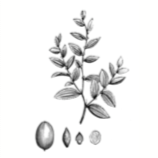12 Key Ingredients
- Californian Poppy: Eschscholzia Californica
- Chamomile Flowers: Matricaria Recutitia
- Hop Flowers: Humulus Lupulus
- Lemon Balm: Melissa Officinalis
- Linden Flower: Tilia Europaea
- Manuka: Leptospermum Scoparium
- Organic Rosewater
- Passion Flower: Passiflora Incarnata
- Peppermint: Mentha Piperita
- Skullcap Leaves and Flowers: Scutellaria Lateriflora
- Valerian Root: Valeriana Officinalis
- Ziziphus Fruit: Zizyphus Jujube
Californian Poppy: Eschscholzia Californica
A sedative that provides relief for the over overthinkers.
Also called Mexican poppy and cup of gold, legend has it that the sun god cast a meteor across the sky long ago to show the earth he loved it. The fragments of this fiery meteor fell to earth forming the seeds of the Californian poppy which sank into the earth and sprang up in patches of golden blossoms. These flowers are little sun worshipers, and as the sun leaves their petals each blossom falls asleep in a tight-rolled silken mantle and on cloudy days they do not wake at all.
Related to the opium poppy but significantly safer and gentler, Californian poppy is an excellent nervous system relaxer and is used for insomnia, sedation and nervous agitation. It works well for people who are stressed and lie awake at night thinking.
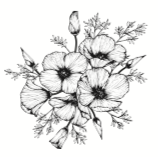
Chamomile Flowers: Matricaria Recutitia
Aids anxiety and restlessness.
Chamomile is one of the oldest known medicinal herbs and is considered a harmonising plant and a ‘lucky’ flower. The Egyptians dedicated it to their sun god Ra as the flower reminded them of the sun for its healing powers. It is one of the Saxons’ nine sacred herbs, the Romans and Ayurvedic physicians used it, and it was so regarded by the Germans that they gave it the label of herb ‘alles zutraut’, meaning “capable of anything”.
Chamomile has a highly complex biochemical composition and has been used for centuries. It has a wide range of benefits including assisting with nervous tension, anxiety, restlessness and insomnia.
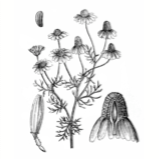
Hop Flowers: Humulus Lupulus
Helps with nervous stress and tension & Provides better quality REM sleep.
Hops is often considered a sun herb because of its tendency to climb anything to reach sunlight, or Mars because of its ‘claws’. Its Latin name (lupulus), means wolf. It is the female flowers of the plant that are used and can be found in dream pillows and sachets to promote a restful sleep and create a gentle feeling of relaxation.
With a long history of use, hops are used in both traditional Eastern and Western herbal medicine as a nerve tonic to ease stress and tension, relieve insomnia and restlessness, improve sleep quality, and for lowering periods of wakefulness and increasing slow-wave sleep (consolidates non-REM sleep).
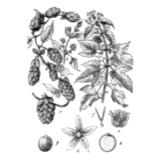
Lemon Balm: Melissa Officinalis
Delivers a refreshing, relaxed sleep.
The name ‘Melissa’ is derived from the Greek honeybee, and according to Pliny the Elder, honeybees were delighted with the lemon balm plant above all others. Lemon balm was a sacred herb in the Temple of Artemis and assisted the ancient beekeepers to keep the sacred honeybees content and well-fed with nectar. In folklore, lemon balm was used to ward off evil, and to promote good health, love, and good cheer. Lemon balm sachets placed under your pillow or near the bed are reputed for providing a refreshing, relaxing sleep.
Lemon balm is licensed as a standard medicinal tea for sleep disorders in Germany. It is used as a component of various sedative and hypnotic drug preparations and is often found as a component in plant-based sleep supplements, like Nod.
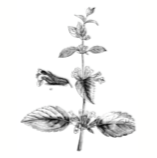
Linden Flower: Tilia Europaea
Relieves anxiety, restlessness and tension.
Linden, also known as lime flower, is considered a sacred tree. The Linden tree has strong connections with medicine and healing. In mythology, the Linden tree is a symbol of peace, truth and justice and associated with Freya, the motherly goddess of truth and love. Considered a “warden tree” it’s said to offer protection to a place and its people, which is why throughout Europe Linden trees stood in the hearts of villages where all the important events occurred.
Substances that occurs in Linden have demonstrated sedative and nervine activity, so it can be helpful for anxiety, restlessness, insomnia, and tension.
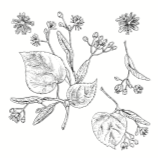
Manuka: Leptospermum Scoparium
A sedative. Helps with immunity.
Maori have had a long relationship with Manuka and have found a wide range uses for it from food, to medicine, through to tools and artefacts. Manuka was also an important medicinal plant of the Maori - it was used for a wide number of ailments, including as a sedative.
Active constituents identified in the plant now validate this action.
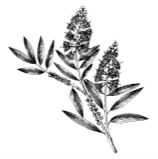
Organic Rosewater
Provides hydration. Improves skin health overnight.
Its anti-inflammatory properties make it a great tool against skin disorders such as rosacea and eczema. Commonly used in skincare products as a spray applied directly to the face for its natural fragrance and moisturising properties - especially lovely during winters. Rosewater, when taken in Nod, hydrates your skin from the inside out.
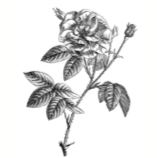
Passion Flower: Passiflora Incarnata
Relieves anxiety. Especially helpful for highly-strung individuals.
The Spaniards who first discovered the passion flower in South America called it ‘Espina de Cristo’ (Christ’s thorns) and noted its use in native medicine as a sedative. Legend also has it that in 1620 a Jesuit priest in Peru came across passion flower and - captivated by its beauty - had a vision, associating the parts of the flower with the Passion of Christ. Ruled by Venus, it is said to bring calm. It can be placed in house to calm trouble and bring peace, and placed beneath pillows it is said to promote sleep.
Passionflower has been extensively researched and is good for nervous, highly strung, excitable individuals, assisting with anxiety and insomnia. Passionflower was approved by Germany’s Commission E for the treatment of “nervous unrest" and it was used during the First World War as a nerve sedative to treat shell-shock.
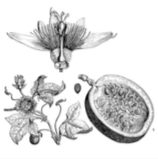
Peppermint: Mentha Piperita
Known for relaxation and calming.
According to Greek mythology the name ‘Mentha’ is derived from ‘Minthe’, a beautiful nymph who was loved by Pluto. Persephone, the goddess of spring, became very jealous of Mintho and changed her into a fragrant mint. It is claimed that the ancient Assyrians used it in rituals to their fire god. Mint has even been found in Egyptian tombs dating back to 1,000 BC. Mint is also linked to Hecate and Venus and often used in love spells. Today’s Peppermint is a combination of common mint and water mint.
Peppermint is an official medicinal plant in the national pharmacopeias in Austria, France, Germany, Great Britain, Hungary, Russia, and Switzerland, and the European Pharmacopoeia. It is used for a range of gastrointestinal conditions but is also used in some sedative and hypnotic drugs to assist relaxation and sleep.
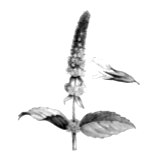
Skullcap Leaves and Flowers: Scutellaria Lateriflora
Provides nervous system support. Is calming and helps with insomnia.
Also known as blue skullcap and helmet flower on account of its pretty blue helmet shaped flowers, skullcap is shaped not unlike a tiny snapdragon. Associated with fidelity love and peace, it is used in sleep pillows for relaxation.
This plant helps to calm nerves and assist with insomnia - it’s helpful for those who have a busy mind. Traditionally, skullcap was used as a nerve tonic and a sedative for relieving anxiety and sleeplessness. It has a calming effect while also revitalising the central nervous system.
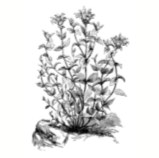
Valerian Root: Valeriana Officinalis
A sedative. Induces sleep and provides a deeper sleep.
The common name of this plant originated from the Latin world ‘valere’ which means "to be strong or healthy". It was believed that valerian had the properties of turning anything bad into good.
It is one of the herbs said to have been used by King Solomon when cleansing his temple and is associated with protection, calm, sleep, love, purification and harmony. It was known as the Valium of the 19th century due to its sedative effects.
Valerian helps modify mood, improves sleep, and is particularly useful for restlessness and insomnia due to nervous origin. It reduces the time it takes to fall asleep and improves the quality of deep sleep.
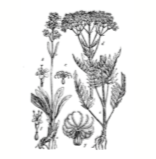
Ziziphus Fruit: Zizyphus Jujube
Calms the mind, induces sleep, and sustains sleep.
The mythological lotus tree mentioned in Homer’s Odyssey is speculated to be a Ziziphus tree. It is considered a holy tree in the Middle East having been utilised as food and medicine for millennia. It is also widely used in China, India and parts of Europe. Ziziphus produces a small aromatic fruit, commonly referred to as a Jujube which looks like a date when fully ripe and is often called red date.
Jujube is helpful as a relaxant and said to improve mood; it is especially effective for people who suffer from sleep problems related to nervousness, stress and anxiety. It calms the mind and helps induce and sustain sleep by increasing time spent in slow-wave and REM, the two most restorative stages of sleep.
